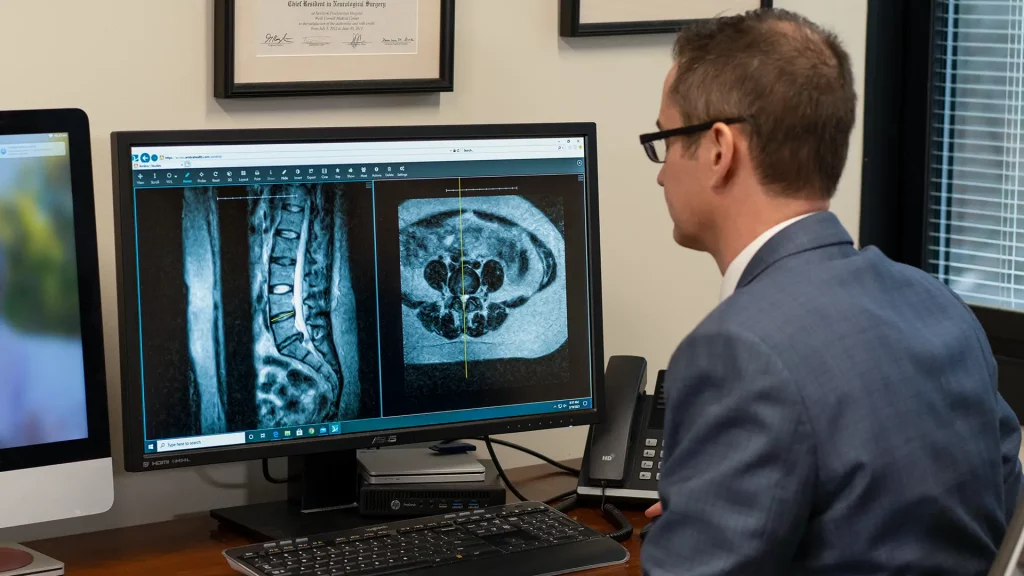What is Herniated Disc Surgery?
Herniated discs can be a painful and debilitating condition that affects the spinal nerves, causing discomfort and a decrease in the quality of life. For many individuals, spine surgery becomes a viable option when conservative treatments fail to provide adequate relief.
In this article, we will explore the cost of herniated disc surgery, including the various factors that can influence the overall expenses.
Because each person’s herniated disc surgery is different, the costs can vary — it’s unlikely that any two surgeries will cost the same. This is because each case is unique and there may be circumstances that will increase or decrease the final total. We will also discuss the benefits of minimally invasive procedures and their impact on recovery and quality of life.
Understanding Herniated Discs
A herniated disc occurs when the soft, gel-like center of a spinal disc protrudes through a crack in the tough exterior. These discs, located between the bones called vertebrae, act as shock absorbers, and provide flexibility to the spine. When a disc herniates, it can put pressure on the spinal nerve roots or even the spinal cord itself.
Pain and Other Symptoms
The pressure on the spinal nerves caused by a herniated disc can lead to various symptoms. These may include localized back pain, as well as radiating pain, weakness, or numbness in the legs or arms, depending on the location of the affected disc. To diagnose a herniated disc, doctors often use imaging techniques like Magnetic Resonance Imaging (MRI).
Conservative Treatment vs. Surgery
Before considering surgery, healthcare providers typically recommend conservative treatment options. These may include rest, physical therapy, anti-inflammatory medications, and epidural injections to manage pain and inflammation. While these methods can be effective for some individuals, others may find that they do not achieve the desired relief. In such cases, spinal surgery becomes an option.
Types of Herniated Disc Surgery
There are various surgical procedures for treating herniated discs, and the choice of surgery can impact the overall cost. One of the most significant advancements in herniated disc surgery is minimally invasive techniques. These procedures involve making a small incision and using specialized instruments to access and remove the herniated part of the disc.
Minimally Invasive Surgery
Minimally invasive surgery for herniated discs offers several advantages.
It allows surgeons to target the specific area of the disc that is causing the problem, minimizing damage to surrounding tissues. This approach can result in less postoperative pain and a quicker recovery time compared to traditional open surgery.
Relieve Pressure on the Spinal Cord
The primary goal of herniated disc surgery is to relieve the pressure on the spinal nerves or spinal cord. By removing the herniated part of the disc, surgeons can alleviate the compression and provide space for the nerves to heal. This can lead to a significant reduction in symptoms, including leg pain and weakness.
The Costs of Herniated Disc Surgery
Because each person’s herniated disc surgery is different, the costs can vary — it’s unlikely that any two surgeries are going to cost the same. This is because each case is unique and there may be circumstances that will increase or decrease the final total.
Here are just some of the factors that contribute to the overall herniated disc surgery cost:
- Radiology: You will require imaging studies of your spine to determine the best course of action for your surgery. This requires the use of specialized equipment and properly trained staff to ensure the best possible images and diagnostics are provided.
- Surgeon(s) and staff: It is of utmost importance that your surgery is well-staffed. This means that your surgeon may require additional support depending on the complexity of your case. Most surgical suite staff will consist of a surgeon, an anesthesiologist, a surgery technician, a surgical assistant, and an operating room (OR) nurse. Additionally, you will have constant monitoring in recovery by specialized doctors and nurses. Each of these individual’s compensation is factored into your surgery total.
- Operating room and recovery facilities use: Each OR and a space in the recovery unit is booked for surgeries, so much like a conference facility, it is reserved especially for your surgery.
- Materials and supplies: A great number of supplies are used for each surgery. These range from sterile operating gloves to gauze, suture material, skin glue and myriad other things necessary for a successful surgery.
- Hospital stay: Your hospital stay may range from 1 – 3 days, on average. During this time you will be in a monitored environment with equipment helping to keep track of your vitals and distribute pain medications and fluids. Depending on what your insurance authorizes, you may be assigned either a private room or a shared room. Food and medications are also factored into the cost of your stay, in addition to any supplies such as bandages or intravenous delivery components. In addition, if you require occupational or physical therapy during this time, the cost of that individual’s services will be considered.
- Follow-up visits: In most cases, follow-ups with imaging will be prepaid. If they’re not, ask for an estimate that will include these charges and make sure your insurance will help cover them.
The last thing you should worry about when you need herniated disc surgery is how much it will cost. Don’t hesitate to ask your insurance company, as well as your healthcare team, for more information regarding what to expect. It is, after all, both your physical and financial well-being that you need to be looking out for!
Improving Quality of Life
Herniated disc surgery can be a life-changing for individuals suffering from debilitating symptoms. While the cost of surgery is something to consider, it’s essential to weigh it against the potential benefits in terms of pain relief and improved quality of life.
Minimally invasive techniques have made herniated disc surgery more accessible and less invasive, reducing recovery times and overall expenses for many patients.
Ultimately, the decision to undergo surgery should be made in consultation with your healthcare provider, considering your specific condition and needs.
The last thing you should worry about when you need herniated disc surgery is how much it will cost. Talk to your insurance company and healthcare team for more info about what to expect. Don’t be afraid to ask questions. It is, after all, both your physical and financial well-being that you need to be looking out for!





